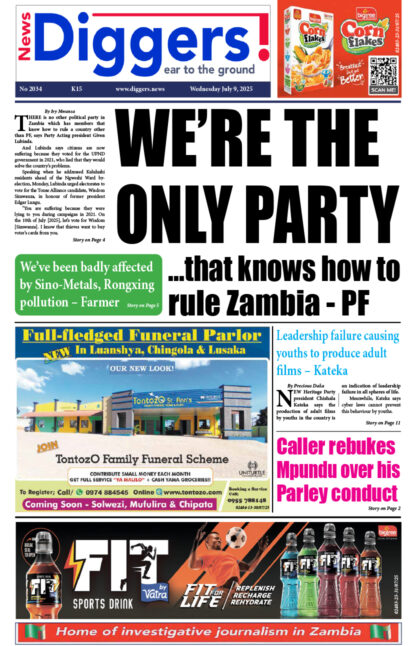It has now become much harder to steal public funds in Zambia, says Finance Minister Margaret Mwanakatwe.
And Mwanakatwe says she is not worried about Zambia’s declining international gross reserves because mitigating measures are being put in place to bolster the reserves.
Speaking to Bloomberg TV in Washington D.C., Friday, Mwanakatwe told the network that it had become much harder for public servants to loot resources following the enactment of the Public Finance Management Act last year.
She was reacting to a question posed to her as to whether there has been a better and more rigorous fight against corruption in sub-Saharan African countries in recent years.
“Indeed, it is becoming more imperative because the citizenry are putting us, leaders, under a lot of pressure to ensure that public funds in the main are kept for public utility. So, for example, in Zambia, the regulation is such that it is becoming more and more stringent and more difficult to steal or to be corrupt. So, once found now with the Act that we have put in place, it has actually taken to task corruption and misappropriation, misapplication and also just stealing from public funds,” Mwanakatwe said.
And when asked about whether she was worried about the declining international gross reserves, Mwanakatwe allayed any concerns, saying that the country’s rising debt stock in relation to infrastructure spending should be deemed as an investment for the future.
Zambia’s gross international reserves by the end of the fourth quarter of last year plummeted to US $1.57 billion, the lowest in the last nine years, while the country’s external debt climbed to US $10.05 billion by the end of 2018 from US $8.74 billion by the end of 2017.
“No, I don’t (worry about falling reserves) because I believe that we have mitigating circumstances and actions that will improve the falling reserves. Yes, it’s 1.9 months’ import cover; we prefer to be at a minimum three (months) and we are aiming towards four months’ import cover,” she replied.
“If I look at the debt that we have contracted over the years, it is debt that has gone into investment; in the main, it is infrastructure development. Zambia is vast; it is 752,000 square kilometres! The opportunity is out there; if I don’t put a road there, how do I harness the potential that is there? So, debt, much as it looks high, it is a debt that we believe that is an investment for the future.”
She explained the measures being undertaken to bolster Zambia’s reserves.
“We are doing things like ensuring that we can take advantage of the gold reserves that are there; we’ve told central bank (Bank of Zambia) to start reserving gold and that is straight away starting,” explained Mwanakatwe.
Mwanakatwe was in Washington D.C. for the 2019 Spring Meetings of the International Monetary Fund (IMF) and the World Bank.
She attended panel events where she shared information on Zambia’s journey in balancing debt vulnerabilities and development needs in the country’s quest to elevate economic growth and meet sustainable development goals.
The Minister also travelled to D.C. to honour invitations by the international community to address elite investors’ and business forums separately organized by Standard Chartered Bank, Barclays Bank, and Bank of America Merrill Lynch for investors from several regions around the globe.
Other members of the high-level Zambian delegation also included Secretary to the Treasury Fredson Yamba, Deputy Secretary to the Cabinet [Finance and Economic Development] Christopher Mvunga, and Bank of Zambia Governor Dr Denny Kalyalya, among others.



















